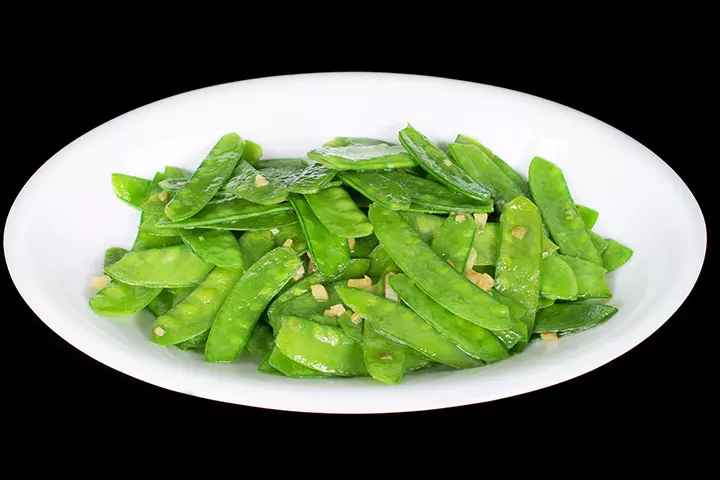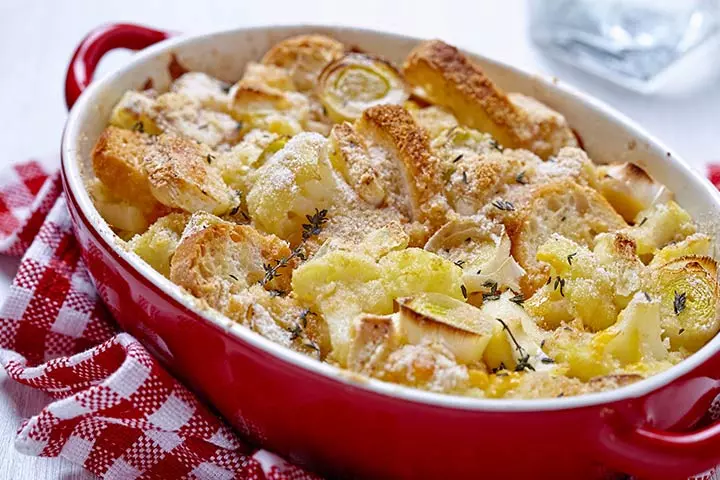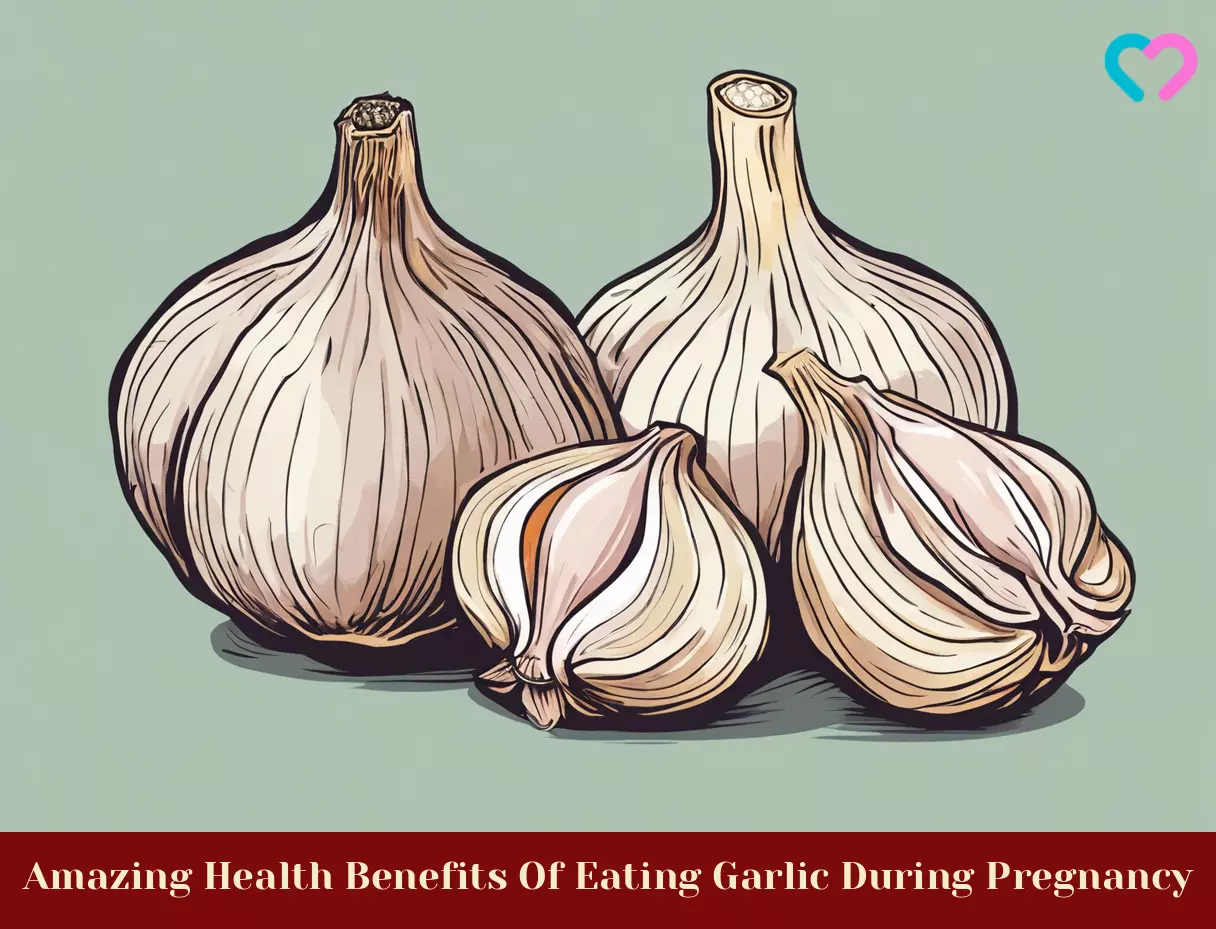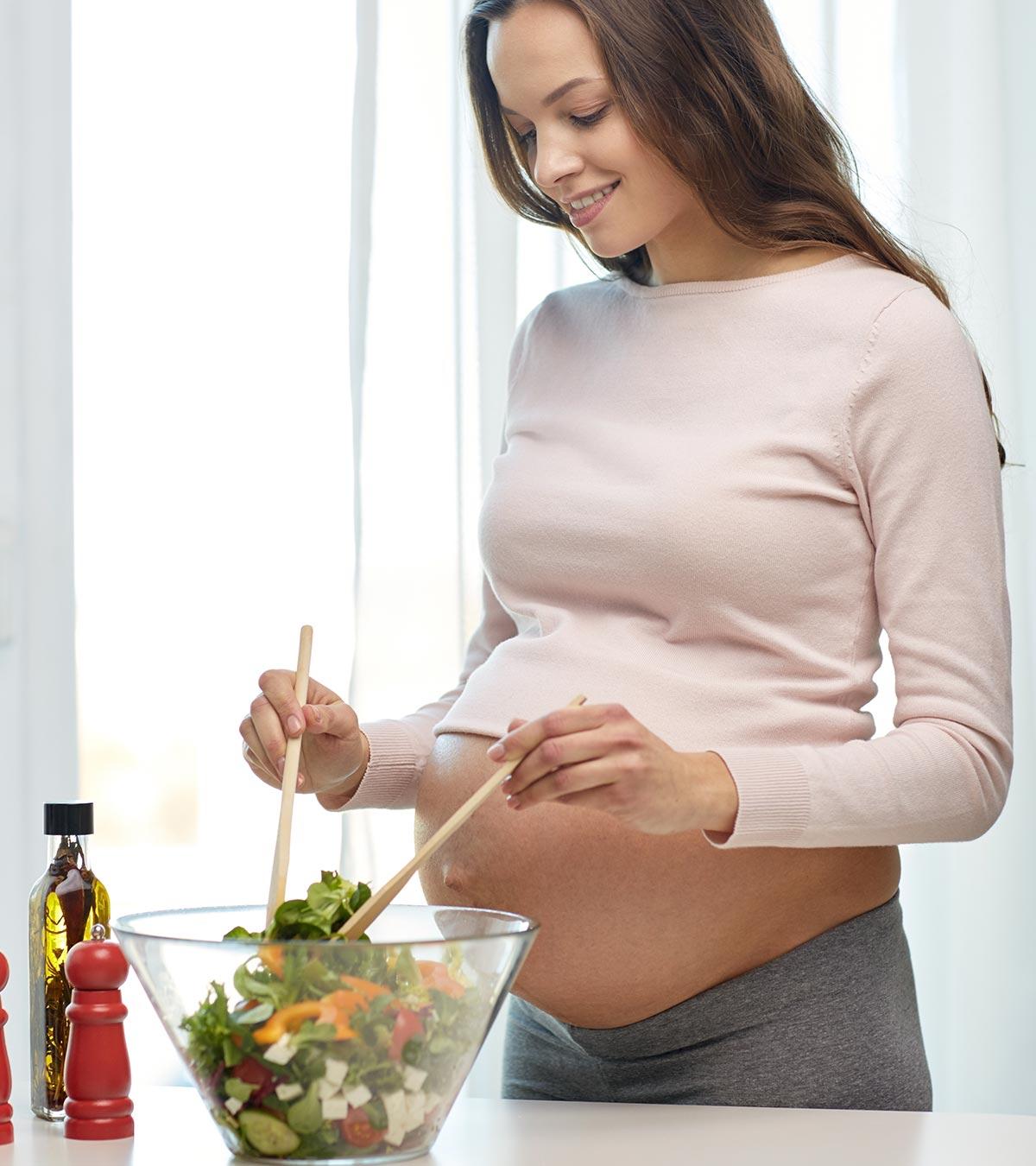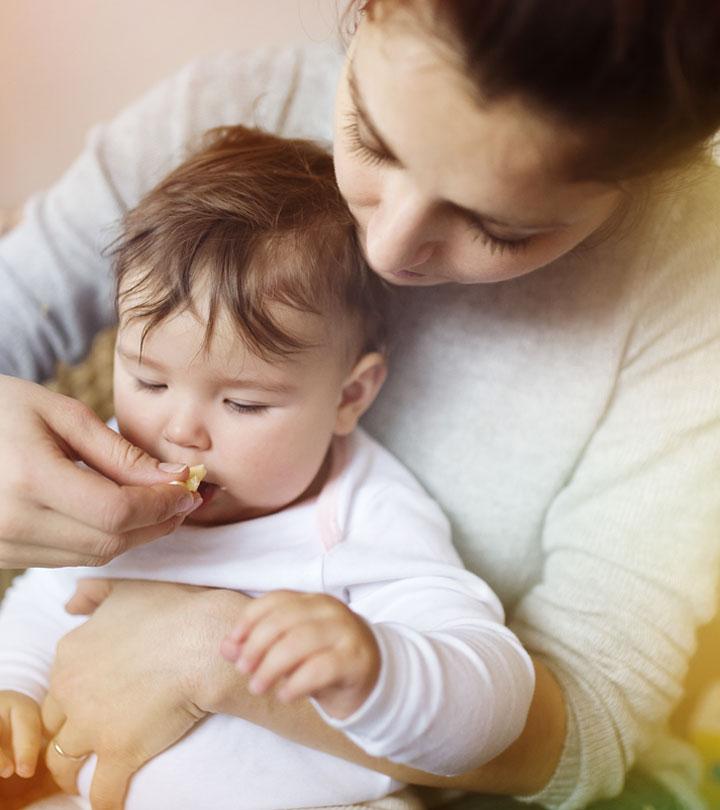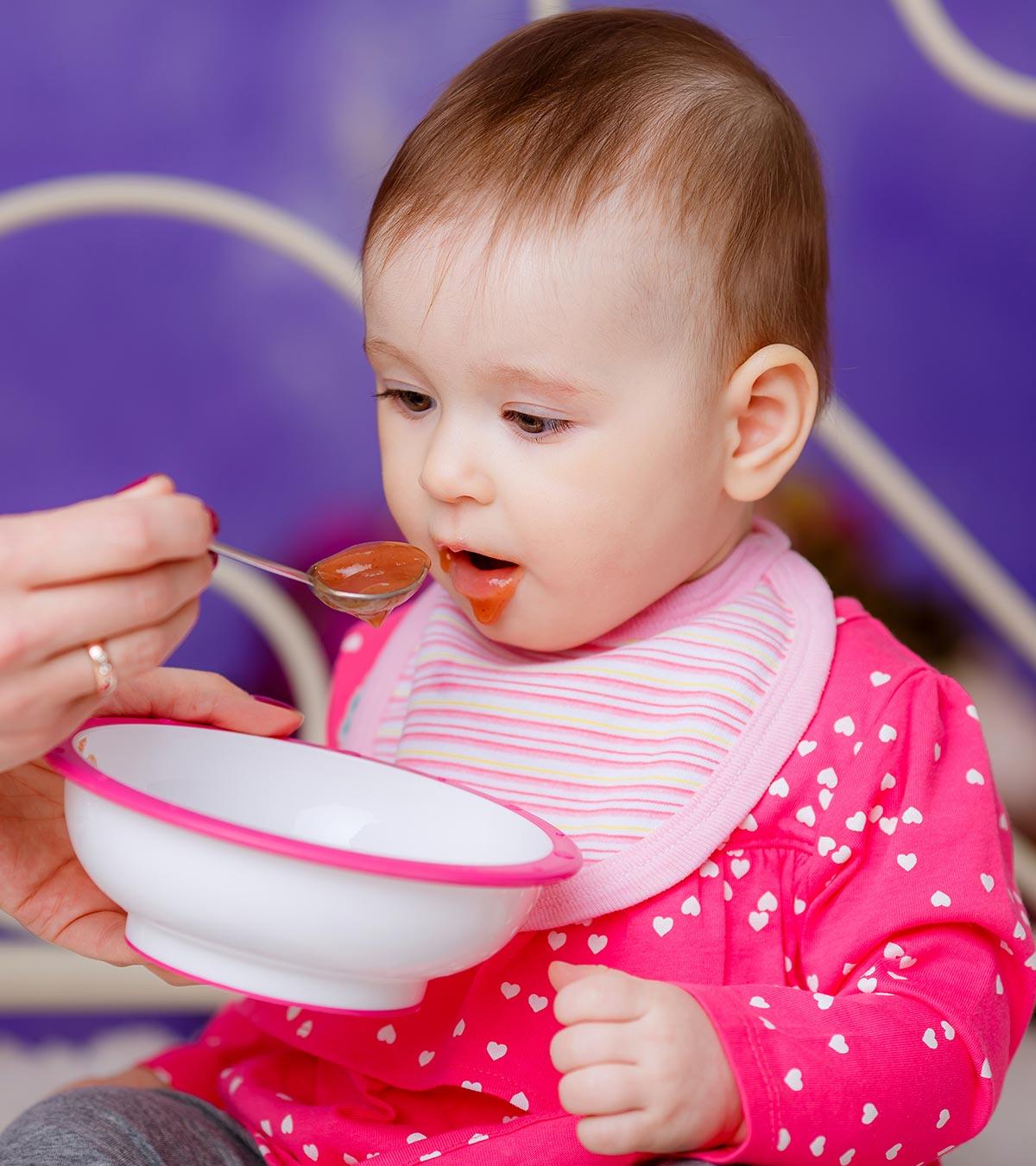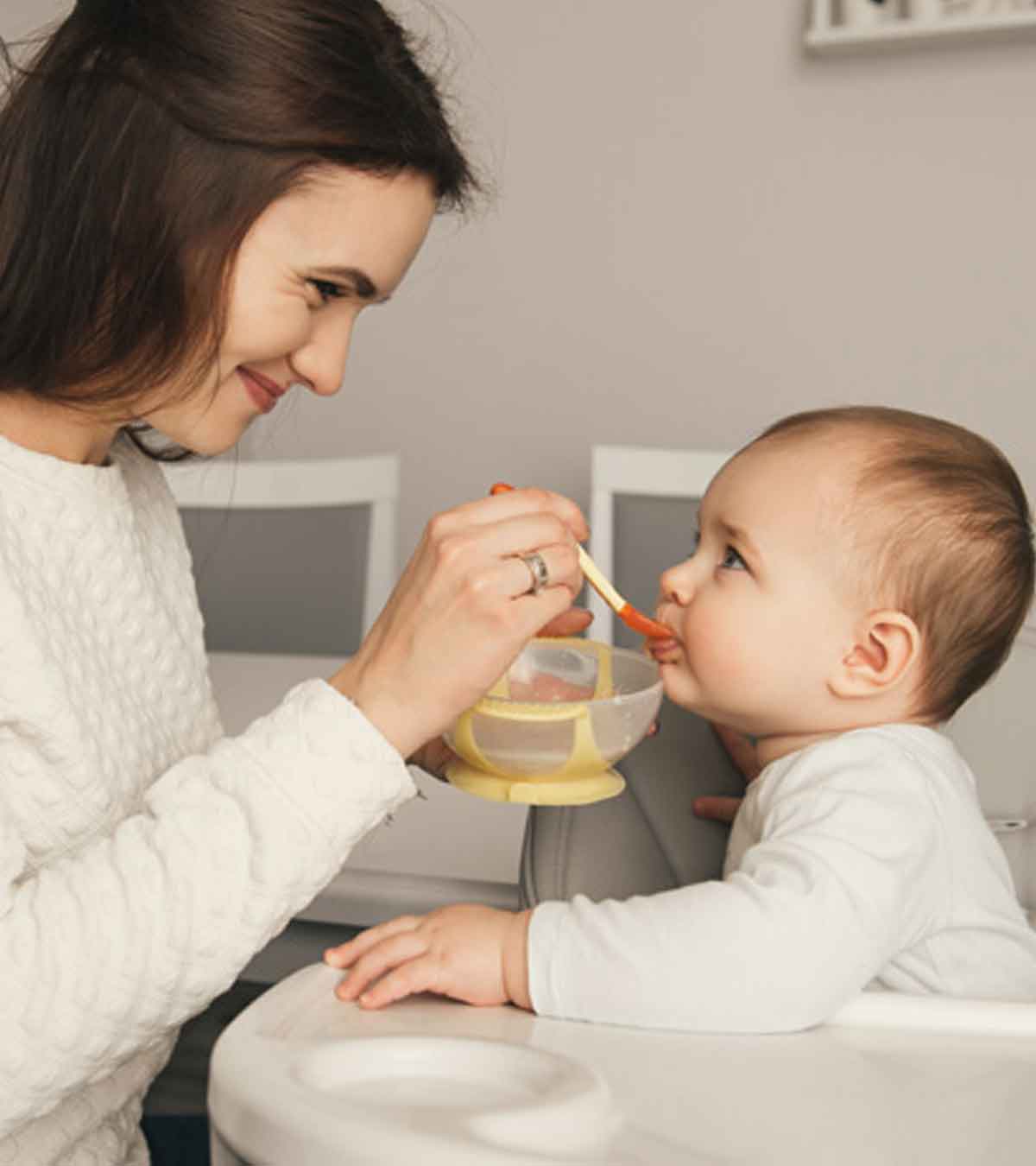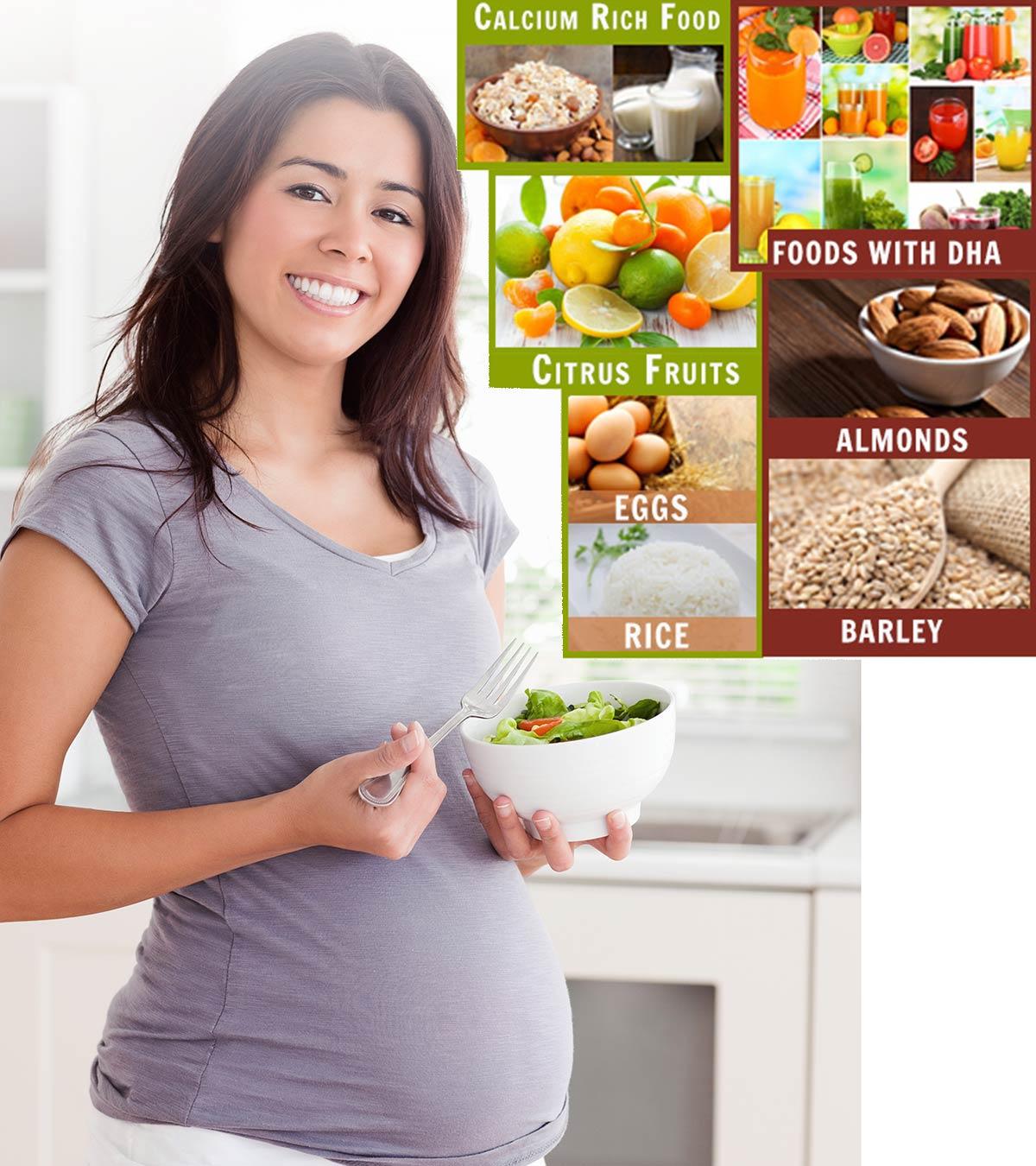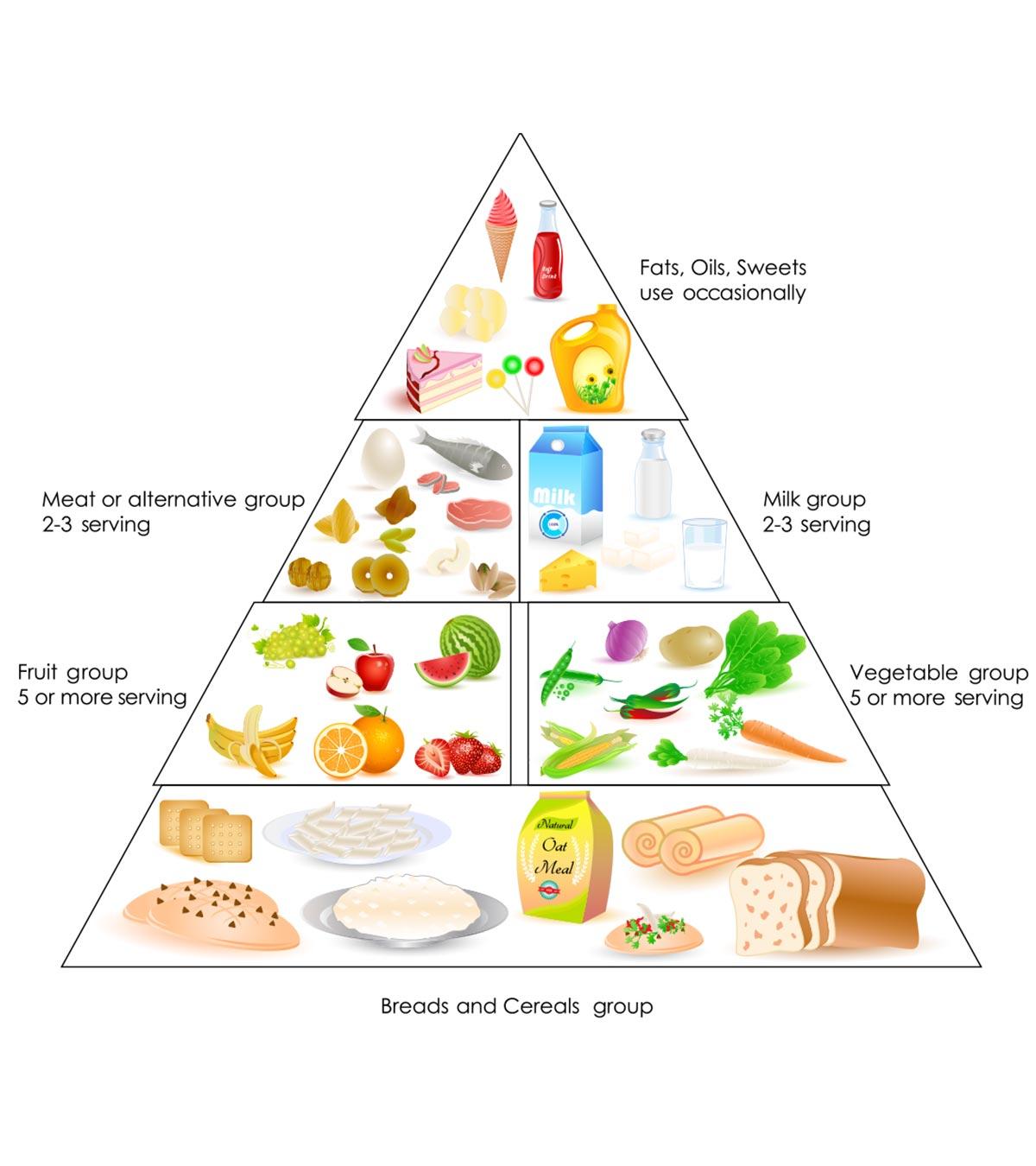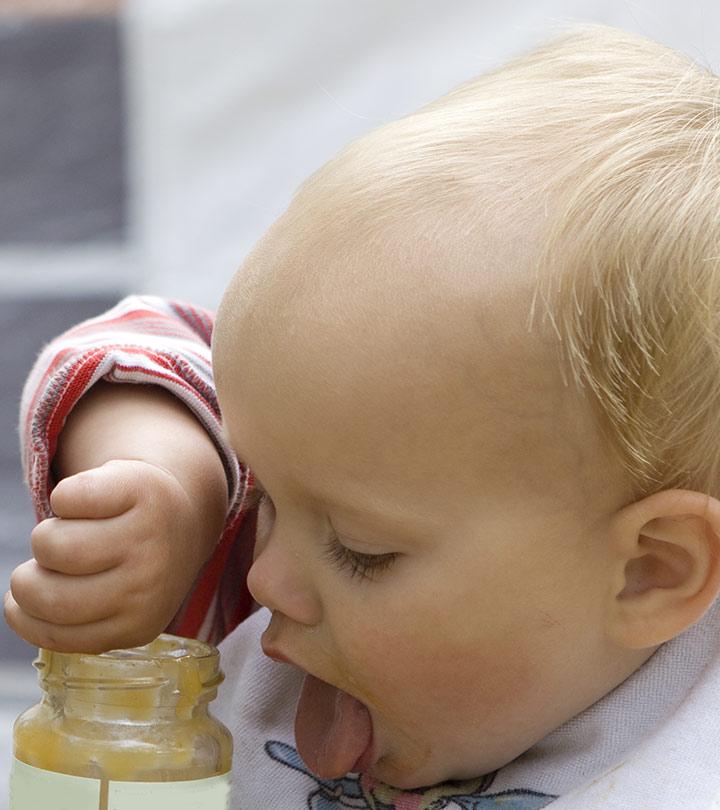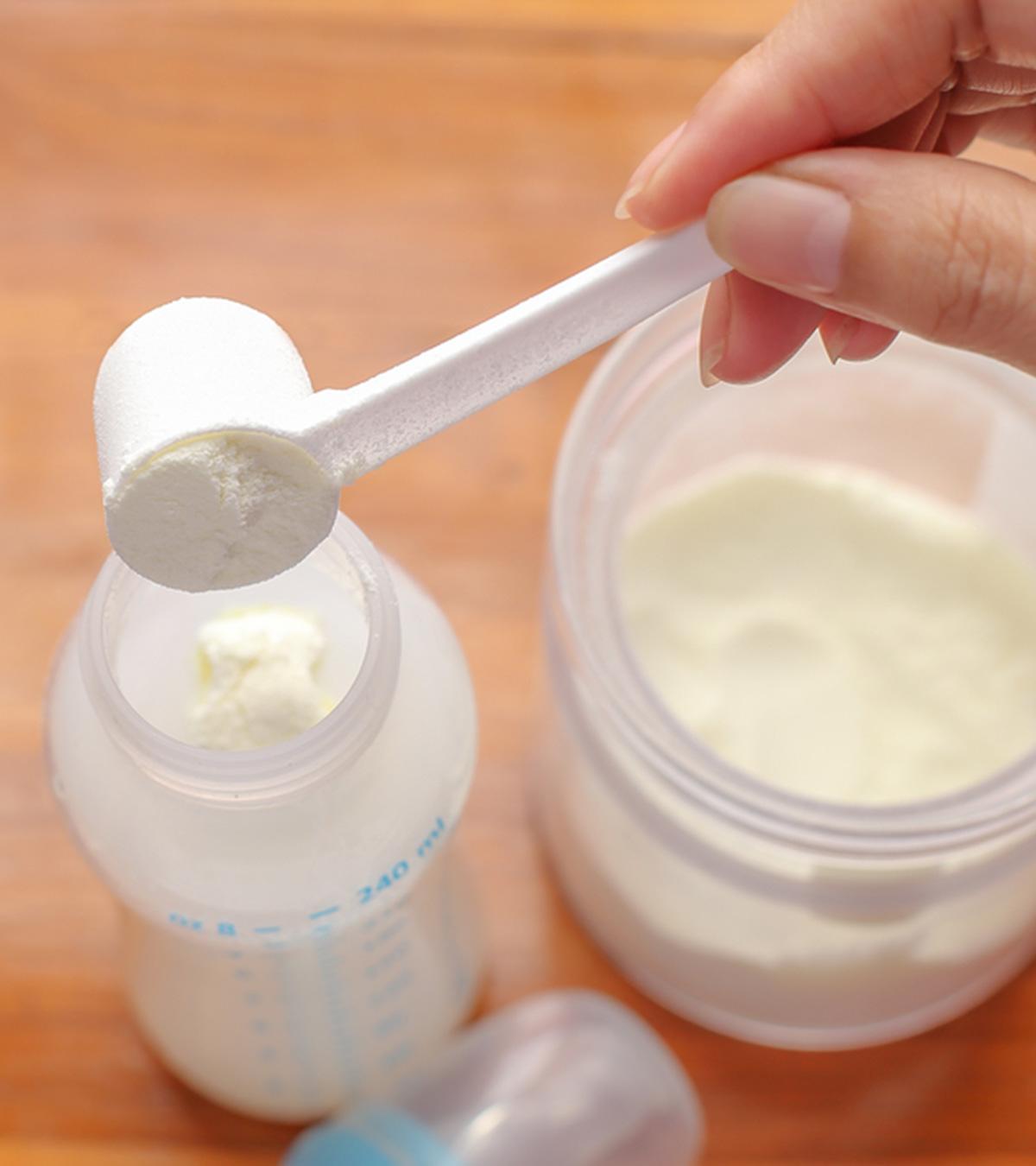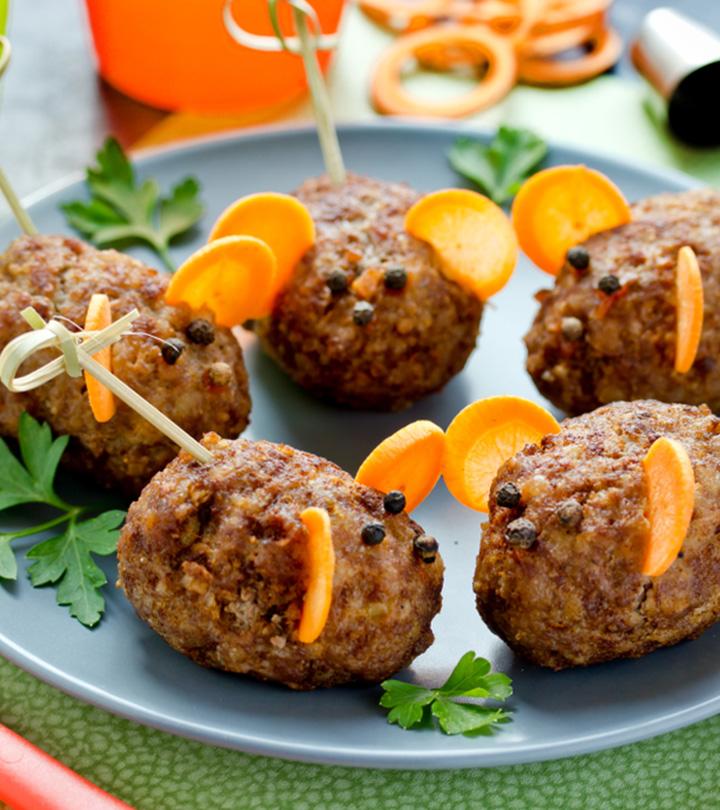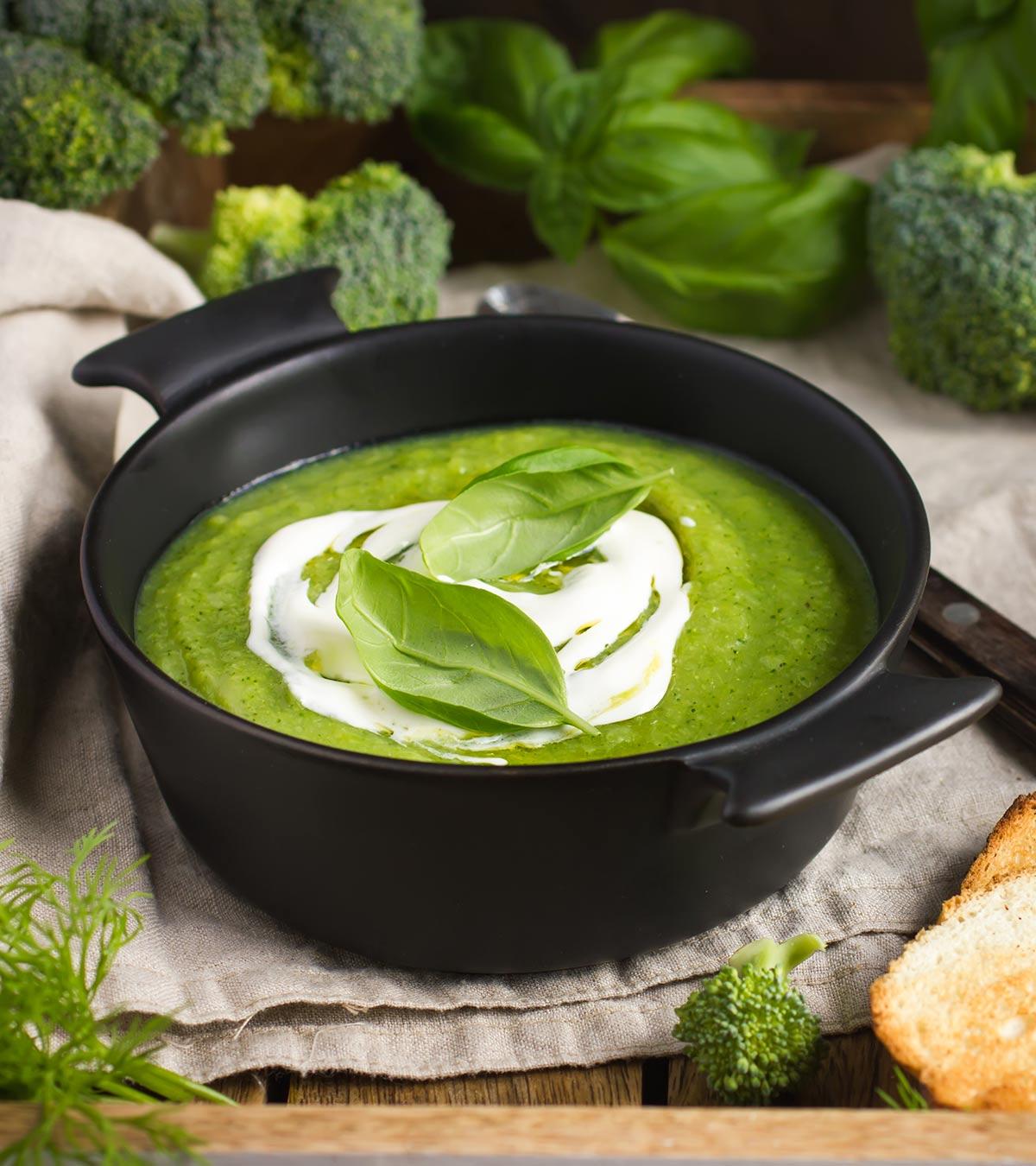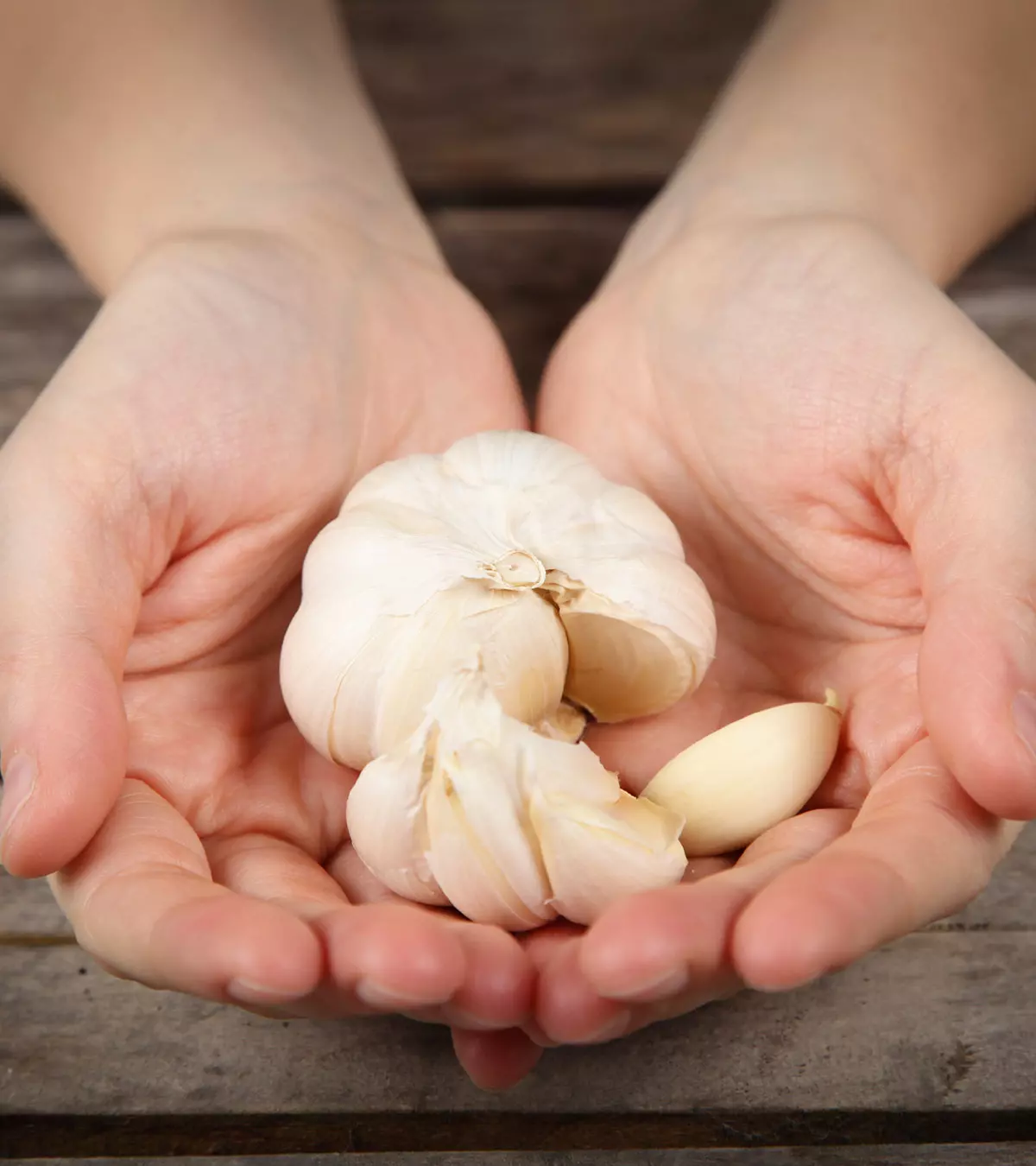
Image: iStock
Garlic is a common culinary ingredient that adds flavor to food. Besides, it offers nutritional and medicinal benefits to promote health over time. But then garlic causes gastric issues in sensitive people, raising a pertinent question – Is garlic during pregnancy safe?
It’s critical to understand this to ensure garlic is not harming either your or your baby’s health. Keep reading as we tell you about the safety of garlic for pregnant women, its possible health benefits, side effects, and a few healthy recipes made with it.
Is Garlic Safe During Pregnancy?
Garlic is considered safe during pregnancy provided it is taken in small amounts. It is safe to include garlic in early pregnancy as foods eaten in this phase will have lesser effect on the fetal development compared to the subsequent trimesters (1).
In the second and third trimesters garlic could lead to two main side effects – lower blood pressure and thinning of the blood — when taken in excess. Therefore, it is advisable to consult your healthcare provider before including it in your pregnancy diet (2). Your doctor will be able to tell you about the safe quantity and precautions you must take while consuming garlic.
How Many Raw Garlic Cloves Can A Pregnant Woman Eat?
Generally, consuming two to four fresh garlic cloves is safe. However, the available research isn’t sufficient to determine the exact safe dose and you should follow your OB/GYN’s advise on the same.
Dr. Laila Kaikavoosi, a UK-based hormone specialist, says, “Pregnant women can include two to four fresh garlic cloves in their daily meals. However, excessive garlic intake should be avoided, as it may have blood-thinning properties that could affect pregnancy.”
You can also get garlic supplements in the form of freeze-dried tablets. These can be taken at a dosage of 400mg thrice a day. Remember to seek your doctor’s approval before consuming garlic in raw or in any other form, to reap the benefits.
Benefits Of Eating Garlic During Pregnancy
Garlic has many benefits, as it could be used as a natural remedy or herbal medicine. Here are some health benefits of eating garlic during pregnancy:
Effect of perinatal garlic oil supplementation on hypertension in rat offspring
Source: Perinatal Garlic Oil Supplementation Averts Rat Offspring Hypertension Programmed by Maternal Chronic Kidney Disease; Nutrients https://www.mdpi.com/2072-6643/14/21/4624Let us now learn about some health benefits of eating garlic during pregnancy:
1. Lowers the risk of preeclampsia
PreeclampsiaiA pregnancy complication characterized by high blood pressure, headaches, swelling of limbs, and protein in urine or high blood pressure is a potentially harmful condition that affects nearly one in ten pregnant women. Garlic cuts down the risk of this condition and decreases the chances of high blood pressure and protein levels in the urine (3).
 Research finds
Research finds2. Boosts baby weight
Research studies reveal that garlic helps improve the birth weight of babies who have the risk of being small or having a pre-term birthiAlso known as premature birth, refers to the birth of a baby before completing 37 weeks in the mother’s womb (4).
Standardized garlic tablets may reduce the chances of labor and birth complications (5). Furthermore, experiments have shown that adding garlic extracts to placental cells stimulated growth. In addition, the enzyme activity reduced in abnormal pregnancy was enhanced when garlic was included in the diet.
3. Lowers cholesterol and heart issues
The magic content in garlic, allicin helps reduce your cholesterol levels and keeps them in check. The same compound also helps thin your blood, reducing the risk of a heart attack or strokeiDamage to brain cells caused by lack of oxygen due to sudden disruption of blood flow (6).
4. Prevents cancer
Eating garlic on a regular basis can protect you against certain forms of cancer, especially colon cancer. According to the US National Cancer Institute (NCI), research studies in China revealed that garlic consumption along with onions and chives is related to lowering the risk of esophagealiRelated to the esophagus, a muscular tube that connects the mouth to the stomach enabling the smooth passage of food and water and stomach cancers (7).
5. Fights cold, flu, and infections
Image: Shutterstock
Garlic can limit the growth of harmful bacteria in your system and boost your immunity. It helps to fight away infections, including cold and flu (8)
6. Treats yeast infections
Allicin present in garlic has anti-fungal properties, which treat various vaginal yeast infections such as chronic candidiasisiA fungal infection caused by a yeast called Candida and yeast hypersensitivity syndrome (9).
7. Prevents skin and oral infections
The antimicrobial properties of garlic are helpful as topical solutions for skin and mouth (10). However, because of the intensity of garlic it must be used with care as it can irritate or burn the skin.
8. Prevents hair loss
Garlic contains a high amount of allicin that is a sulfur-based compound. It helps prevent hair loss and also promotes the growth of new hair (11).
Garlic is beneficial when eaten in moderation. Do remember that overeating garlic could lead to a few side-effects.
 Did you know?
Did you know?Potential Side Effects Of Eating Garlic During Pregnancy
Image: IStock
While garlic is otherwise considered a healthy herb, in some cases, it can cause a negative reaction. Here are some instances where you should be careful about your garlic intake:
- Garlic has blood thinning properties. This means that you could bleed more than normal, which could be a major issue especially during surgical procedures or cesarean section (12).
- Garlic supplements can interact with anti-clotting medications. They interact with insulin, thus lowering blood sugar levels (13). This is another reason why it is so important to consult your physician prior to starting a new supplement.
- Too much garlic can upset your digestive system, and lead to stomach issues. In this case, you should see a doctor if you have any health concerns.
There is also a possibility that you may get an aversion to garlic smell during your pregnancy. Kelly, a mother to one, shares how she could not tolerate the aroma of garlic, “In my pregnancy, one of the first symptoms that hit me was my acute sense of smell. I felt like a dog, literally, being able to smell scents from a mile away. From garlic in all forms (fried, raw, hidden in the depths of food – unfortunately, Asian food uses A LOT of it), to coffee and even hand soap, I detested smells with a vengeance (i).”
Garlic is safe to consume when taken in small amounts. Below we give you a list of garlic recipes that are good for your health during this delicate time.
Garlic Recipes
Garlic is widely used in the traditional dishes of many cultures across the globe. Once your doctor has given you the go-ahead to eat garlic during pregnancy, you can try the following recipes that contain a healthy amount of garlic.
1. Cauliflower soup with toasted garlic
You will need:
- 3 cloves of sliced garlic
- 2 tbsp. of olive oil
- 1 small head of cauliflower, chopped
- 5 cups of low sodium chicken broth
- 1 tbsp. of freshly chopped thyme leaves
- Kosher salt and black pepper for taste
How to:
- Cook garlic in heated oil over medium heat. Stir it for about two to three minutes until it turns golden brown and starts to give off its aroma. Once done, remove and reserve the garlic.
- Add cauliflower, broth, thyme, one teaspoon salt and one-fourth teaspoon black pepper in the pot. Let it all simmer for about 15 to 20 minutes or until the cauliflower turns tender.
- Pour the mix into a blender and puree it to a smooth consistency.
- Now top with the roasted garlic and also add a drizzle of oil. Garnish with additional thyme just before serving.
Preparation time:
40min
Servings: 4
2. Garlic snow peas stir fry
You will need:
- 3 garlic cloves, minced
- 2 cups snow peas, trimmed
- ½ tbsp. cooking oil
- 1 tsp. sesame oil
- Toasted sesame seeds (for garnishing)
- Pinch of salt
How to:
- Boil water in a medium-sized pot, and add cooking oil, a pinch of salt, and snow peas. Cook for one minute and drain the water.
- Fry minced garlic in a wok and add boiled snow peas with salt and sesame oil. Stir fry and transfer immediately.
- Top it with toasted sesame seeds before serving.
Preparation time:
10min
Servings: 2
3. Roasted garlic and leek bread casserole
You will need:
- 1 large head of garlic
- 3 tbsp. extra virgin olive oil
- 2 cups water plus 2 tbsp. water
- 8 slices of bread with the crusts removed
- 4 cups of halved and thinly sliced leeks – use only the white and the light green parts
- ½ tsp kosher salt or sea salt
- 1 cup of shredded cheese
- 1 tbsp. freshly chopped thyme
- 1/4th tsp fresh ground black pepper
- Water
How to:
- Preheat the oven to 375°F.
- Add about ½ teaspoon oil and 1/4th inch of water to a baking dish. Roast the garlic until it turns tender but is still a bit firm. It should take about 30 minutes for the same. Once it is done, let it cool, and then peel off the cloves. Slice them up thinly and set aside.
- Add three cups of water in a pan and bring to a boil. Put the bread in a heatproof dish and pour water over it, so that the bread is completely under water. Let the bread stand in the water for about three to five minutes. Now put the bread in a colander and gently squeeze it to drain out the water. Once you are done, the bread will still be moist but there will be no water dripping from it.
- Break the bread into small pieces and place it in a bowl.
- Heat a tablespoon of oil in a pan over medium heat till it starts to simmer. Now add the leeks, two tablespoons of water and ¼thteaspoonsalt. Let it cook partially and place a lid on top. Keep stirring occasionally until the leeks turn tender, but ensure they do not lose their green color. It should take about five to seven minutes for the leeks to get done.
- Add the leeks to the bread and add the sliced garlic, 1and ½ tablespoon oil, thyme, cheese, black pepper and the remaining ¼th teaspoon salt. Mix everything gently, preferably using your hands. Spread the mix in a baking dish and add the remaining oil on top.
- Bake it for about 30 minutes or till it turns golden and crisp.
Preparation time:
1hr 20min
Servings: Makes 3/4th cup
4. Honey garlic chicken
Image: Shutterstock
You will need:
- 4 boneless, skinless chicken breasts
- 1/4 cup honey
- 3 cloves garlic, minced
- 2 tbsp. low-sodium soy sauce
- 1 tbsp. olive oil
- 1/2 tsp. ginger, grated
- 1/4 tsp. salt
- 1/4 tsp. black pepper
- 1 tbsp. cornstarch
- 2 tbsp. water
- Fresh parsley, green onions, or red pepper flakes for garnish
How to:
- Combine honey, garlic, soy sauce, olive oil, ginger, salt, pepper, and red pepper flakes in a bowl.
- Marinate chicken in half of this mixture in a sealed bag for at least 30 minutes.
- Preheat the oven to 375°F (190°C). Sear chicken in an ovenproof skillet, then bake with reserved marinade for 20-25 minutes.
- Thicken sauce with cornstarch slurry. Garnish and serve.
Preparation time:
40-45 minutes
Servings: 4
Speak to your doctor before you try these delicious and healthy recipes of garlic during pregnancy.
In the next section, we cover a few common questions that mothers may have about consuming garlic while pregnant,
Frequently Asked Questions
1. Are there any side effects of eating raw garlic on an empty stomach?
2. Are garlic pills during pregnancy good?
Garlic pills or supplements are useful in treating pregnancy-related blood pressure conditions such as pre-eclampsia and pregnancy hypertension. But sometimes they can also cause problems for you and your baby when taken in excess. Therefore, you should talk to your healthcare provider before planning to use garlic pills.
3. What happens if you eat too much garlic when pregnant?
Taking too much garlic can adversely affect your digestion, and it can lead to stomach problems. If this is the case, you should discontinue its consumption and see your doctor immediately.
4. Can garlic terminate pregnancy or cause miscarriage?
According to the book, Fundamentals of Pharmacology, consuming garlic at doses exceeding those in foods can lead to a miscarriage. Therefore, you should be careful about the amount you include in your food (15).
5. Can garlic dissolve a blood clot?
Studies show that garlic may be effective in enhancing fibrinolysis which is the process of breaking down a blood clot and help in dissolving a clot in blood vessels (16).
6. Is it better to chew or swallow garlic?
Research suggests that chewed garlic is more effective than swallowed garlic in reducing triglycerides, cholesterol, and blood pressure (17).
Garlic during pregnancy is considered a superfood and medicine because of its nutritional and therapeutic benefits. Moreover, it is generously used in many dishes worldwide to enhance the flavor. Nevertheless, consider foods in moderation during pregnancy to not cause any harm to your and your baby’s health. Keep your healthcare advisor informed of the quantity of garlic you consume regularly, and follow their advice to reap maximum benefits from the foods you eat.
Infographic: Benefits And Side Effects Of Garlic During Pregnancy
Almost every food during pregnancy must be taken with caution, and garlic is no exception. Although it is a healthy flavoring agent with therapeutic properties, too much garlic can cause side effects. So before you include this in your diet, learn about the positives and negatives to stay aware. Illustration: Momjunction Design Team
Key Pointers
- Garlic is generally safe to consume during pregnancy, but it should be consumed in moderation.
- Pregnant women can safely eat two to four cloves of garlic per day, or an equivalent amount of garlic supplements.
- Garlic has several health benefits during pregnancy, including reducing the risk of preeclampsia, boosting baby weight, lowering cholesterol and heart risks, and preventing cancer.
- However, garlic has blood-thinning properties and can interact with anti-clotting medications and insulin.
- Excessive consumption of garlic can cause adverse reactions such as increased bleeding, low blood sugar levels, and digestive issues.
Image: Stable Diffusion/MomJunction Design Team
Personal Experience: Source
MomJunction articles include first-hand experiences to provide you with better insights through real-life narratives. Here are the sources of personal accounts referenced in this article.
i. Things I didn’t know about pregnancy (1st trimester);https://pilatesandprints.wordpress.com/2020/08/09/things-i-didnt-know-about-pregnancy-1st-trimester/
References
- Garlic and Organosulfur Compounds.
https://lpi.oregonstate.edu/mic/food-beverages/garlic - Karin Ried et al.; (2016); The effect of aged garlic extract on blood pressure and other cardiovascular risk factors in uncontrolled hypertensives: the AGE at Heart trial.
https://www.ncbi.nlm.nih.gov/pmc/articles/PMC4734812/ - Sammya Bezerra Maia e Holanda Moura et al.; (2012); Prevention of Preeclampsia.
https://www.ncbi.nlm.nih.gov/pmc/articles/PMC3534321/ - Ronny Myhre et al.; (2013); Intakes of Garlic and Dried Fruits Are Associated with Lower Risk of Spontaneous Preterm Delivery.
https://www.ncbi.nlm.nih.gov/pmc/articles/PMC3681545/ - A Makris et al.; (2005); Garlic increases IL-10 and inhibits TNFalpha and IL-6 production in endotoxin-stimulated human placental explants.
https://pubmed.ncbi.nlm.nih.gov/16226132/ - Waris Qidwai and Tabinda Ashfaq; (2013); Role of Garlic Usage in Cardiovascular Disease Prevention: An Evidence-Based Approach.
https://www.ncbi.nlm.nih.gov/pmc/articles/PMC3652202/ - C M Gao et al.; (1999); Protective effect of allium vegetables against both esophageal and stomach cancer: a simultaneous case-referent study of a high-epidemic area in Jiangsu Province China.
https://pubmed.ncbi.nlm.nih.gov/10429652/ - Razina Rouf et al.; (2020); Antiviral potential of garlic (Allium sativum) and its organosulfur compounds: A systematic update of pre-clinical and clinical data.
https://www.ncbi.nlm.nih.gov/pmc/articles/PMC7434784/ - Yeast Infections.
https://www.berkeleyparentsnetwork.org/advice/health/yeastinfection - Guoliang Li et al.; (2015); Fresh Garlic Extract Enhances the Antimicrobial Activities of Antibiotics on Resistant Strains in Vitro.
https://www.ncbi.nlm.nih.gov/pmc/articles/PMC4458355/ - Biljana Bauer Petrovska and Svetlana Cekovska; (2010); Extracts from the history and medical properties of garlic.
https://www.ncbi.nlm.nih.gov/pmc/articles/PMC3249897/ - Garlic.
https://www.nccih.nih.gov/health/garlic - Garlic.
https://www.drugs.com/npp/garlic.html - BC Mathew and RS Biju; (2008); Neuroprotective Effects of Garlic A Review.
https://www.ncbi.nlm.nih.gov/pmc/articles/PMC3074326/ - Alison Norris et al.; (2016); Abortion experiences among Zanzibari women: a chain-referral sampling study.
https://www.ncbi.nlm.nih.gov/pmc/articles/PMC4788822/ - S Ziaei et al.; (2001); The effect of garlic tablet on plasma lipids and platelet aggregation in nulliparous pregnants at high risk of preeclampsia.
https://www.sciencedirect.com/science/article/abs/pii/S0301211501003840 - Abbas Jabbari, et al.; Comparison between swallowing and chewing of garlic on levels of serum lipids, cyclosporine, creatinine, and lipid peroxidation in Renal Transplant Recipients.
https://www.ncbi.nlm.nih.gov/pmc/articles/PMC1173136/# - H Fakhar and A Hashemi Tayer; (2012); Effect of the Garlic Pill in comparison with Plavix on Platelet Aggregation and Bleeding Time.
https://www.ncbi.nlm.nih.gov/pmc/articles/PMC3915434/#
Read full bio of Dalia Kinsey
- Dr. Laila Kaikavoosi graduated from King's College London Medical School in 1999. She completed her General Practice training in London and gained membership in the Royal College of General Practitioners in 2007. Dr. Kaikavoosi is a Diplomat of the Faculty of Reproductive and Sexual Health. She practiced and trained in teaching hospitals in the UK and USA.
 Dr. Laila Kaikavoosi graduated from King's College London Medical School in 1999. She completed her General Practice training in London and gained membership in the Royal College of General Practitioners in 2007. Dr. Kaikavoosi is a Diplomat of the Faculty of Reproductive and Sexual Health. She practiced and trained in teaching hospitals in the UK and USA.
Dr. Laila Kaikavoosi graduated from King's College London Medical School in 1999. She completed her General Practice training in London and gained membership in the Royal College of General Practitioners in 2007. Dr. Kaikavoosi is a Diplomat of the Faculty of Reproductive and Sexual Health. She practiced and trained in teaching hospitals in the UK and USA.
Read full bio of Rebecca Malachi
Read full bio of Reshmi Das









